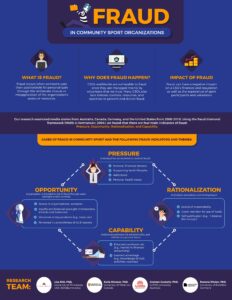Community sport clubs in Canada can be vulnerable to financial fraud, where someone uses their position for personal gain by deliberately misusing an organisation’s resources or assets. According to our research, recently featured in a CBC Sports investigation, the impact of fraud can be deep and last for years, regardless of the amount of money stolen. Sport organizations in Canada are speaking up and telling their stories to help others learn and reduce their risk.
Incidents of fraud not only impact a sport organization’s finances, they can also affect the organization’s reputation, the experiences of sport participants and volunteers, opportunities for participation, and can generate community mistrust (Kihl, Misener, Cuskelly, & Wicker, 2020). The purpose of this blog is to provide research-based evidence about how and why sport clubs may be vulnerable to fraud and outline ways that sport organizations can be pro-active and reduce their risk. It draws upon our research team’s examination of media stories from Australia, Canada, Germany, and the United States from the years 2008-2018.
Indicators of Fraud
Our research, building on the fraud diamond outlined by Wolfe and Hermanson (2004), shows that there are four common indicators and themes in cases of fraud in community sport:
- Pressure – individuals who commit fraud often have incentives such as personal financial stressors, health problems including addiction, or lavish lifestyles.
- Rationalization – those who have committed fraud may deny responsibility, claim good intentions, or may self-justify their actions.
- Capability – individuals who possess the characteristics and skills to conduct fraudulent activity may be educated in finance or have a learned advantage.
- Opportunity – a lack of oversight regarding account access to bank accounts, financial reporting mechanisms, or vacancies of board positions can increase the risk of fraud.
These indicators help us understand how and why fraud can occur in sport organizations.
How is money being stolen?
According to our research, the main form of fraud that occurs in community sport organizations is embezzlement of four types:
- Forging and writing blank cheques;
- Siphoning funds (i.e., dishonestly taking money from an organization and using it for a purpose for which it was not intended);
- Creating false accounts; and
- Acquiring credit cards.
The Association of Certified Fraud Examiners (2018) reported that skimming schemes (cash being taken prior to it being entered into an accounting system) were more common globally in the arts, entertainment, and recreation industries than in other sectors (e.g., banking, manufacturing, health care or social services).
How can sport organizations prevent fraud?
Sport organizations should use a three-tiered approach to fraud prevention including training/education for organizational leaders on financial management best practices to increase awareness of risk; enhancing internal club management processes to limit opportunities for fraud; and detecting instances of fraud quickly after they occur. Is also important that sport organizations develop and implement specific measures. For example:
- Ensure timely and accurate financial reporting systems, including mandatory monthly financial reporting and full disclosure to the board.
- Implement procedures to safeguard assets, such as requiring expense and account creation authorisation by two or more individuals.
- Implement practices that are compliant with laws and regulations, including regular procedures to detect any possibility of fraudulent activities (i.e., external auditing, independent reconciliation of bank statements).
- Evaluate routines for handling organisational resources, such as eliminating e-transfers through personal bank accounts and ensuring the organization has established policies for collecting cash through player registrations, concessions, and fees, and mandatory reporting of fraud to authorities.
Moving towards a more robust anti-fraud strategy is an ongoing process that will require education, planning, and time as systems are changed to both prevent and detect potentially fraudulent activities. While these controls may be accompanied by increased costs for the organization in terms of time, energy, and some additional financial expense, the benefits should outweigh the costs and associated risks of not implementing financial controls. Ultimately, preventing fraud in sport will ensure the long-term sustainability of your organization and the important sport programs and services you deliver to your community.
Our research team is continuing to examine risk management practices and the ways fraud can be prevented in community clubs and associations. Community sport leaders interested in being involved in the next phase of the research are invited to click here for more information and to connect with the survey.
